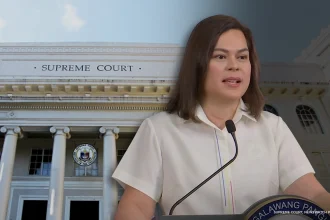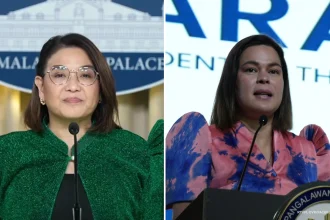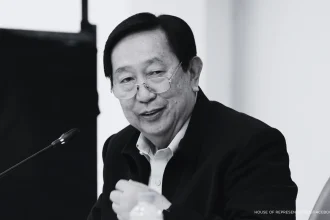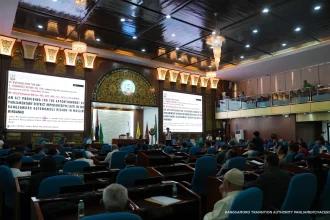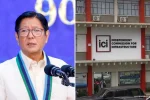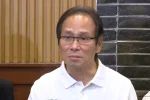
Metro Manila, Philippines – Ideally, the decision on Vice President Sara Duterte’s impeachment trial should be based solely on evidence, but political analysts and some senator-judges themselves acknowledge that politics will inevitably play a role.
“Tingin ko dito, ang mga primary considerations nila ay… number one, political alignment. Number two, yung possible repercussions of voting against the vice president,” political analyst Dennis Coronacion told NewsWatch Plus on Thursday, May 15.
[Translation: I think their primary considerations here are… number one, political alignment. Number two, the possible repercussions of voting against the vice president.]
Coronacion, chairperson of the University of Santo Tomas Political Science Department, said the victory of five senatorial candidates endorsed by the Dutertes shows that the family remains a political force.
“Kasi itong midterm elections, nagflex ng muscle yung Duterte camp and they were able to demonstrate that they are still relevant, that they are still powerful. Kasi despite what’s happening to them, they have managed to make four senatorial candidates in their camp win in these elections,” he added.
[Translation: Because in these midterm elections, the Duterte camp flexed its muscles and was able to show that they’re still relevant, that they’re still powerful. Despite everything happening to them, they managed to get four senatorial candidates from their camp elected.]
Re-electionists and Duterte allies Christopher “Bong” Go and Ronald “Bato” dela Rosa placed first and third, respectively, in the Magic 12, followed by SAGIP party-list Rep. Rodante Marcoleta in sixth place. All three are part of the Partido Demokratiko Pilipino (PDP) slate, chaired by former President Rodrigo Duterte.
Guest candidates who made it into the winning 12 include Las Piñas Rep. Camille Villar, who ranked 10th, and presidential sister Senator Imee Marcos, who took the final spot. While Marcos formally withdrew from the administration’s Alyansa Para sa Bagong Pilipinas slate, Villar stayed aligned with both competing camps.
In an earlier interview with NewsWatch Plus, Dela Rosa said they plan to form a “Duterte bloc” or “PDP Plus bloc” in the Senate, together with party president Senator Robin Padilla – bringing the group to at least six members.
Dela Rosa called it a “protest vote,” reflecting what he said was the public’s condemnation of the Marcos administration’s decision to surrender former President Duterte to the International Criminal Court.
Presumptive Senator Vicente “Tito” Sotto III, who served as Senate president during the Duterte administration, stated that President Ferdinand Marcos Jr.’s endorsement still played a significant role in the election outcome, citing the victory of six of his endorsed candidates, including himself, Villar, Erwin Tulfo, Ping Lacson, Pia Cayetano, and Lito Lapid.
They will be among the 24 senator-judges in the impeachment trial, expected to begin when the 20th Congress opens in July.
Acquittal votes seen
Only nine votes are needed to acquit Duterte. The Constitution requires a two-thirds vote in the Senate to convict an impeached official.
Coronacion believes the numbers favor acquittal, based on the number of senators who remain friendly with the Duterte camp.
“Pero there should be a caveat kasi ito controversial matter. Ang ating analysis might be simplistic kasi we might not be able to capture the nuances of the dynamics in the Senate,” he said.
“It’s a complex institution. The people there, our senators have their own agenda mixing with, of course, the political alignment and they’re also saying that they’re going to judge based on the merits of the case,” he added.
Senators have pledged to remain neutral and impartial once they don the impeachment robes.
But when asked if he would vote to convict Duterte if there were sufficient grounds, Dela Rosa declined to give a categorical answer.
“Do not push me to the corner. I’ll just tell you that as much as possible, I will maintain my being apolitical and being neutral but still, it is a reality that the impeachment trial is not a judicial process. It is a political process,” he said in an episode of The Newsmaker on Wednesday.
“Yung mga nakaupo na mga hurado, na mga senador they are all political animals so hindi mo maiwasan na may mga kanya-kanyang political biases ‘yan,” he added.
[Translation: The sitting jurors, the senators, are all political animals, so you can’t avoid the fact that each of them has their own political biases.]
“But then again, with due respect to the institution where we belong to the Senate, we have to maintain our neutrality as much as possible. At pagdating diyan sa botohan, sa amin na ‘yan, konsyensya na namin iyan kung anong magiging boto namin [When it comes to the voting, that’s on us—that will be up to our conscience how we cast our vote],” Dela Rosa went on.
Can an endorsee really vote against their endorser?
“It depends on who we’re talking about. Pero it’s possible siguro. It’s possible na may ganon, very objective despite the fact that he or she is politically identified with the vice president’s camp,” Coronacion said.
[Translation: It depends on the individual. But I think it’s possible. It’s possible that someone remains objective, even if they are politically aligned with the vice president’s camp.]
Anybody’s game
Senate President Francis “Chiz” Escudero said he believes that the current composition and alliances in the Senate cannot determine the outcome of the impeachment trial, given the shifting politics, among other factors.
“Yung mga inendorse dati, kinakalaban na nila ngayon yung mga nagendorse sa kanila dati. Yung kalaban nila dati, kakampi na nila ngayon. So kung ang pagbabasehan ko ay kasaysayan, hindi ng partikular na senador ah, kasaysayan sa larangan ng pulitika ng ating bansa, nakikita natin na nagbabago bago yon,” he said in a Kapihan sa Senado media forum.
[Translation: Those they once endorsed, they now oppose; those who opposed them before, they now consider allies. So if I base it on history – not of any particular senator, but of our country’s political landscape – we can see that these dynamics constantly change.]
He added that in his 15 years in the Senate, he has seen lawmakers cross party lines on key issues and legislation.
Ultimately, he said, it will be up to each senator-judge to decide – and to stand by their vote.
“Kailangan nilang harapin sa sarili nila, sa salamin, at sa taong bayan ‘yong kanilang magiging pasya. Kung ang nagdikta nga ba ng kanilang desisyon sa impeachment ay ‘yong personal nilang interes o nakabatay sa ebidensya at sa batas at sa pananaw ng mas nakararami base sa kanilang napanood na ebidensya,” Escudero said.
[Translation: They need to face themselves, the mirror, and the public with the decision they will make. Whether their decision on the impeachment was dictated by their personal interest or based on evidence, the law, and the perspective of the majority, based on the evidence they have seen.]
“Hayaan nating tumakbo ang proseso at hayaan nating magpasya ang impeachment court [Let us allow the process to run its course and let the impeachment court decide],” he added.
Malacañang has consistently distanced itself from the impeachment trial amid the political rift between the Duterte and Marcos families.
Duterte is the first vice president to face an impeachment trial, with charges primarily concerning her alleged misuse of confidential funds and threats against the Marcos family. She has sought Supreme Court intervention to halt the proceedings. A ruling is still forthcoming.









